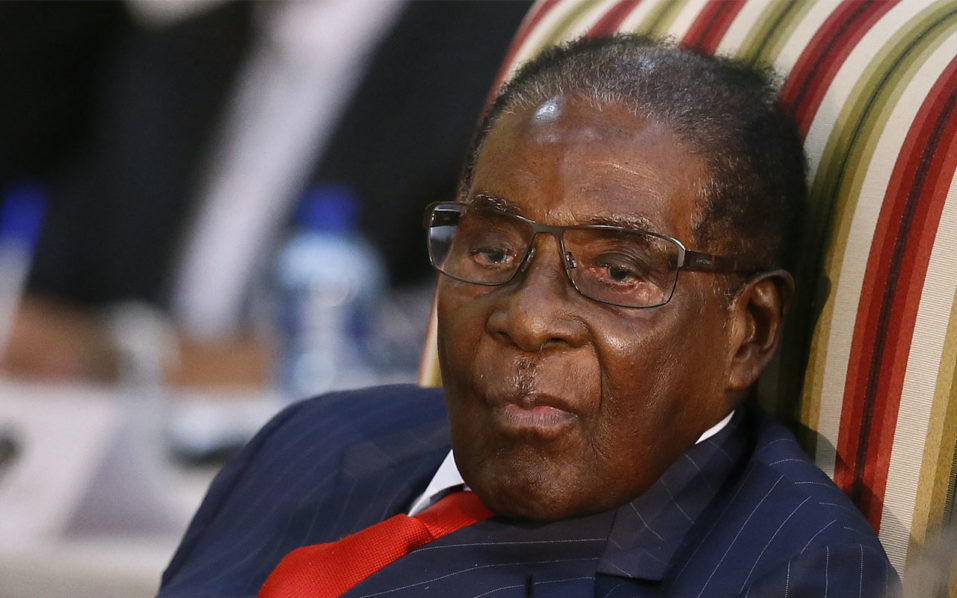 |
| Robert Mugabe |
Zimbabwean President, Robert Mugabe, stunned his people in his speech on Sunday, maintaining that he would preside over his party-ZANU-PF-congress in December.
Many political observers and fellow Zimbabweans had been waiting for 93-year-old Mugabe to step aside as President after nearly 40 years in power, Reuters reports.
But observers questioned how he could oversee the conference if he was no longer the leader of the party.
The address came hours after he was expelled as the leader of ZANU-PF, which gave him until noon of Monday (today) to resign or face impeach by Parliament.
Mugabe, who ruled Zimbabwe with an iron grip until the military placed him under house arrest last Wednesday also refused to say whether he would resign.
Sitting at a table while flanked by members of the military and other officials — including a priest — the embattled President spoke for 20 minutes and acknowledged problems in the nation.
He also referred to himself as President and “commander-in-chief” — and declared he would preside over his party’s congress, scheduled to take place in a few weeks.
“I will preside over its processes, which must not be prepossessed by any acts calculated to undermine it or to compromise the outcomes in the eyes of the public,” he said.
Party officials earlier on Sunday removed his wife, Grace Mugabe — widely viewed as his likely successor — as head of the ZANU-PF Women’s League and barred her from the party for life.
It also appointed Emmerson Mnangagwa, the vice-president previously fired by the President, as Mugabe’s successor to lead the party.
The stunning rebuke by the central committee of Mugabe’s party came after emergency talks to address the political crisis. Under the constitution, Mr. Mugabe remains president despite the party’s expulsion.
Many Western news outlets had alerted the world to a pending resignation, citing confidential sources. But it was not to be — at least in the speech on Sunday night.
Mugabe made the rambling, halting televised address to the southern African nation about 9pm local time after intense negotiations at the State House with the country’s Army generals about the conditions of what was expected to be his departure.
On Saturday, thousands of Zimbabweans had taken to the streets to celebrate Mr. Mugabe’s seeming fall from power after the military seized control but was careful not to call it a coup.
Many political observers and fellow Zimbabweans had been waiting for 93-year-old Mugabe to step aside as President after nearly 40 years in power, Reuters reports.
But observers questioned how he could oversee the conference if he was no longer the leader of the party.
The address came hours after he was expelled as the leader of ZANU-PF, which gave him until noon of Monday (today) to resign or face impeach by Parliament.
Mugabe, who ruled Zimbabwe with an iron grip until the military placed him under house arrest last Wednesday also refused to say whether he would resign.
Sitting at a table while flanked by members of the military and other officials — including a priest — the embattled President spoke for 20 minutes and acknowledged problems in the nation.
He also referred to himself as President and “commander-in-chief” — and declared he would preside over his party’s congress, scheduled to take place in a few weeks.
“I will preside over its processes, which must not be prepossessed by any acts calculated to undermine it or to compromise the outcomes in the eyes of the public,” he said.
Party officials earlier on Sunday removed his wife, Grace Mugabe — widely viewed as his likely successor — as head of the ZANU-PF Women’s League and barred her from the party for life.
It also appointed Emmerson Mnangagwa, the vice-president previously fired by the President, as Mugabe’s successor to lead the party.
The stunning rebuke by the central committee of Mugabe’s party came after emergency talks to address the political crisis. Under the constitution, Mr. Mugabe remains president despite the party’s expulsion.
Many Western news outlets had alerted the world to a pending resignation, citing confidential sources. But it was not to be — at least in the speech on Sunday night.
Mugabe made the rambling, halting televised address to the southern African nation about 9pm local time after intense negotiations at the State House with the country’s Army generals about the conditions of what was expected to be his departure.
On Saturday, thousands of Zimbabweans had taken to the streets to celebrate Mr. Mugabe’s seeming fall from power after the military seized control but was careful not to call it a coup.
In this article:
